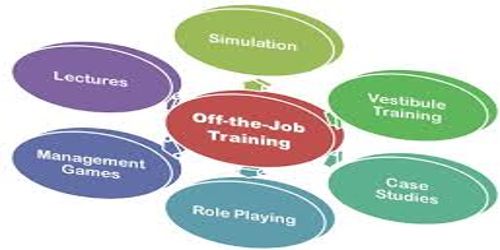Training is the set of organized activities aimed at imparting information and or instructions to improve the recipient’s performance or to help him or her attain a required level of knowledge and skill then the organized activities are known as training. It aims to fulfill the gap in current skills and required skills as per job requirement.
Off the job training methods
The off-the-job training method is employee training at a site away from the actual work environment. It often utilizes lectures, case studies, role-playing, simulation, etc. Off-the-job training methods are conducted in separate from the job environment, study material is supplied, there is full concentration on learning rather than performing, and there is freedom of expression. Important methods include:
Lectures and Conferences: Lectures and conferences are the traditional and direct method of instruction. Every training program starts with a lecture and conference.
It’s a verbal presentation for a large audience. However, the lectures have to be motivating and creating interest among trainees. The speaker must have considerable depth in the subject. In the colleges and universities, lectures and seminars are the most common methods used for training.
Vestibule Training: Vestibule Training is a term for near-the-job training, as it offers access to something new (learning). In vestibule training, the workers are trained in a prototype environment on specific jobs in a special part of the plan.
Simulation Exercises: Simulation is any artificial environment exactly similar to the actual situation. There are four basic simulation techniques used for imparting training: management games, case study, role-playing, and in-basket training.
- Management Games: Properly designed games help to ingrain thinking habits, analytical, logical, and reasoning capabilities, the importance of teamwork, time management, to make decisions lacking complete information, communication, and leadership capabilities. Use of management games can encourage novel, innovative mechanisms for coping with stress.
- Case Study: Case studies are complex examples which give an insight into the context of a problem as well as illustrating the main point. Case Studies are trainee centered activities based on topics that demonstrate theoretical concepts in an applied setting.
- Role Playing: Each trainee takes the role of a person affected by an issue and studies the impacts of the issues on the human life and or the effects of human activities on the world around us from dm perspective of that person.
- In-basket training: In-baskets exercise, also known as in-tray training, consists of a set of business papers winch may include e-mail SMSs, reports, memos, and other items. Now the trainer is asked to prioritize the decisions to be made immediately and the ones that can be delayed.
Sensitivity Training: Sensitivity training is also known as laboratory or T-group training. This training is about making people understand about themselves and others reasonably, which is done by developing the social sensitivity and behavioral flexibility. It is an ability of an individual to sense what others feel and think from their own point of view.
Transactional Analysis: It provides trainees with a realistic and useful method for analyzing and understanding the behavior of others. In every social interaction, there is a motivation provided by one person and a reaction to that motivation given by another person.
















